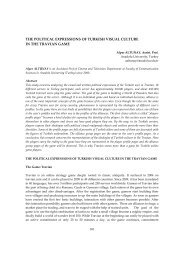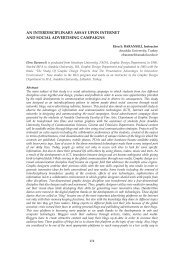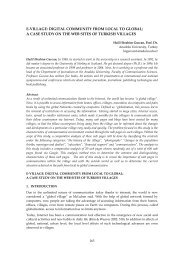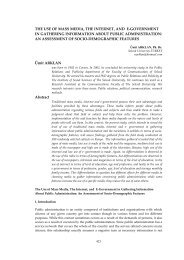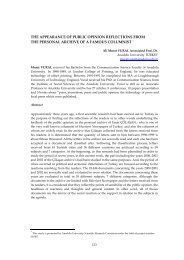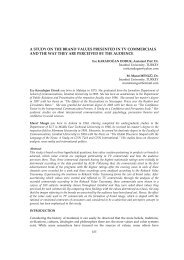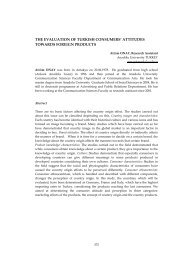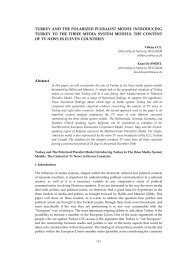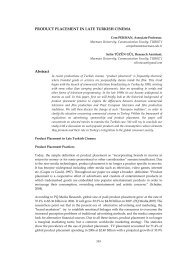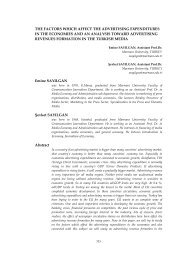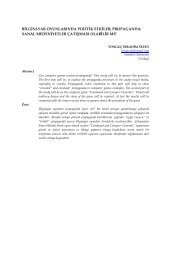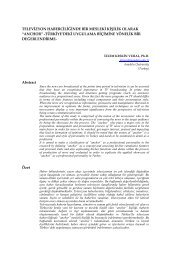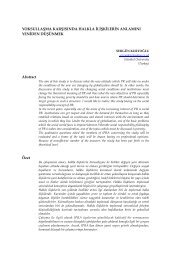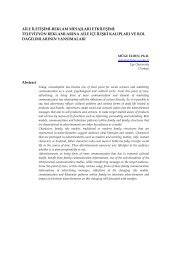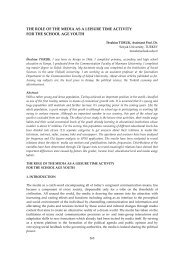SURFING POLITICS: INTERNET USE AND POLITICAL ACTIVISM ...
SURFING POLITICS: INTERNET USE AND POLITICAL ACTIVISM ...
SURFING POLITICS: INTERNET USE AND POLITICAL ACTIVISM ...
Create successful ePaper yourself
Turn your PDF publications into a flip-book with our unique Google optimized e-Paper software.
media malaise position – but this influence is produced in a positive direction, that is to say,<br />
maintaining and promoting democratic participation.<br />
The theories of political mobilization appear on the academic scene with a great influence in the<br />
nineties (Holtz-Bacha, 1990; Norris, 1996; Newton, 1999; Norris, 2000), right after the publication<br />
of some research conclusions. We could say that the first works in this line arise as a result of the<br />
contrast of the media malaise hypotheses. To some extent, this interpretation considers that by<br />
simply differentiating some analytical categories we can conclude that the media malaise<br />
theories are not strictly applicable as they were formulated. Fundamentally, mobilization<br />
theories underline that “we need carefully to disentangle the positive and negative effects of different<br />
media, messages, audiences and effects” (Norris et al., 1999: 99). In this sense, for example, the group<br />
of regular consumers of television news and habitual readers of political press are – regardless<br />
of tone of media coverage – more inclined to be informed, interested and committed to political<br />
life. On the contrary, citizens exposed to sensationalist contents usually present significant levels<br />
of political disaffection, cynicism and alienation.<br />
Finally, it is vital to mention the importance of a theory that, although framed within the<br />
theories of the mobilization, acquires a special status, since its considerations entail significant<br />
advances with respect to the general assumptions; the theory of the Virtuous Circle (Norris,<br />
2000). In spite of proposing a similar perspective to the contributions of the theory of political<br />
mobilization and objecting to the conclusions of the media malaise, the theory of the virtuous<br />
circle, stated by Pippa Norris, goes one step further and provides a more complete theoretical<br />
elaboration. As a result of the examination of empirical evidence derived from data analysis of<br />
the United States and Western Europe, one of the main assumptions of this theory resides in the<br />
following statement: the attention to the news in general is not configured as a factor that<br />
contributes to the erosion of the support for the political system. On the contrary, those<br />
consistently exposed to news and electoral campaigns are revealed as most knowledgeable in<br />
political terms, as most trusting of the government and the political system, and as the most<br />
participative in electoral terms.<br />
In conclusion, Pippa Norris assures that the process of political communication could be<br />
understood as a virtuous circle since, in the long term, it reinforces the activism of the activists.<br />
Indeed, given that this mechanism works in a circle, like a spiral, we can observe a double<br />
directionality; the most politically informed, those who trust more and are more participative,<br />
are those who are more exposed to the media coverage of public issues. Those that are more<br />
exposed to the to the media coverage of public issues are made more committed to the political<br />
system. This assumption implicates that we cannot prove causation or, in other words, the<br />
direction of causality remains unresolved. It is supported by empirical data which shows that<br />
especially regular readers of political newspapers are less disaffected than people not reading<br />
the political press. In contrast, watching television news does not seem to have the same positive<br />
effect (Holtz-Bacha, 1990; Newton, 1999; Norris, 2000).<br />
STUDY FRAMEWORK <strong>AND</strong> HYPOTHESES<br />
Both contradicting hypotheses have mainly been examined in the U.S. context and seem to be<br />
supported by empirical evidence to the same extent. But not all of the studies have paid<br />
attention to the increasing importance of the Internet and introduced this new outlet in their<br />
models. Therefore, taking as a starting point the potential involvement of the new media in the<br />
process of political disaffection, we are going to focus on the so-called non-conventional ways of<br />
political participation.<br />
Additionally, as a research strategy we are going to deal with the latent differences between<br />
countries in the European context (Klingemann, 1999) since when it comes to political<br />
237



